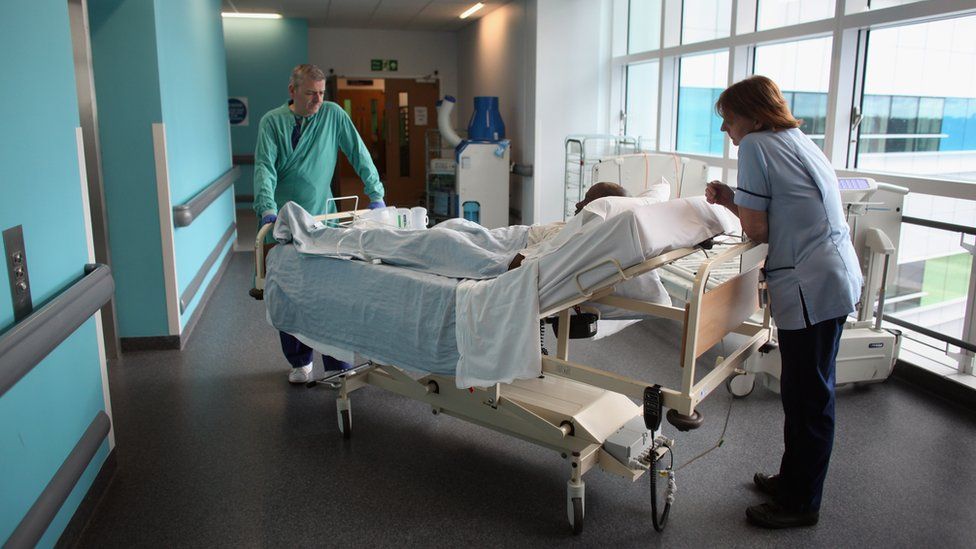Hospital waiting times at worst-ever level
- Published

Hospital performance in England is at its worst level on record, data shows.
Key targets for cancer, hospital care and A&E have been missed for over three years - with delays for hospital care and in A&E hitting their highest levels since both targets were introduced.
The monthly figures - the last before the election - prompted Labour and the Liberal Democrats to attack the Tories' record on the NHS.
But Prime Minister Boris Johnson said "huge demand" was to blame.
He said only the Tories could be trusted to have a "strong, dynamic economy" to ensure the rises in the NHS budget being planned could be made.
"I'm afraid when I look at the rival proposals and the economic disaster that Jeremy Corbyn and the Labour Party would cause, that will make it impossible for us in the long term to fund the NHS."
But Labour leader Mr Corbyn said the performance figures were "disgusting" and a lack of staff and funding was to blame.
And Liberal Democrat health spokeswoman Luciana Berger said the Tories had a "shameful" record.
All the parties are proposing to increase the NHS budget. The government announced a five-year funding plan last year, which would see the front-line budget rise by 3.4% a year up to 2023.
On Wednesday, Labour said it would spend more - 3.9% extra a year.
The Lib Dems are proposing to use a penny rise in income tax to invest extra in social care, mental health and public health.
How bad is performance?
Demand for all services is rising and the NHS is still managing to see the over-whelming majority in time.
But performance has been deteriorating for a number of years - and is now well below what it should be.
The figures show:
- 4.42 million patients on the waiting list at the end of September, the highest number ever
- 84.8% of them waiting under 18 weeks - below the 92% target and the worst performance since the target was introduced, in 2012
- 76.9% of cancer patients starting treatment within 62 days - below the 85% target
- 83.6% of A&E patients admitted or transferred within four hours in October - below the 95% target and the worst performance since the target started was introduced, in 2004
Scotland, Wales and Northern Ireland are also missing their targets, although health is devolved so NHS decisions are taken by the administrations in those parts of the UK.
'I was left in excruciating pain'
Frances Reid, 55, is one of many patients to have faced a long wait.
She said she was left in "excruciating" pain waiting for a hip replacement.
Ms Reid, from South Cambridgeshire, was referred for surgery in January 2018, after struggling for the previous two years with hip pain.
She should have been seen in April 2018, but waited until July for her surgery.
The NHS ended up paying for her to be treated at a private unit because of the wait.
"The final weeks were really difficult," she says.
"I was waking up six, seven times a night and had to use walking sticks to get around.
"Daily tasks like shopping became very difficult."
Health leaders fear for NHS
Dr Nick Scriven, of the Society of Acute Medicine, said: "These figures are truly worrying as we haven't even reached the 'traditional' winter period yet."
He said urgent action was needed, warning the system was "imploding".
British Medical Association leader Dr Chaand Nagpaul said the NHS was facing a "catastrophe".
"This is completely unfair for patients and staff."
But Chris Hopson, chief executive of NHS Providers, which represents health managers, tweeted senior staff should be more careful with the language they used, criticising the use of imploding in particular.
However, he admitted he was worried about the "huge pressure" on the system at this point before the full onset of winter.
NHS England conceded hospitals were under pressure, seeing "more older and sicker patients".
A spokesman said, with winter coming, hospitals would be opening extra beds.
But he urged the public to play their part by getting the flu jab and using the 111 phone line and NHS online services "as first port of call for non-emergencies".
- Published14 November 2019
- Published11 September 2018
- Published4 January 2018
- Published26 December 2017
- Published21 December 2017